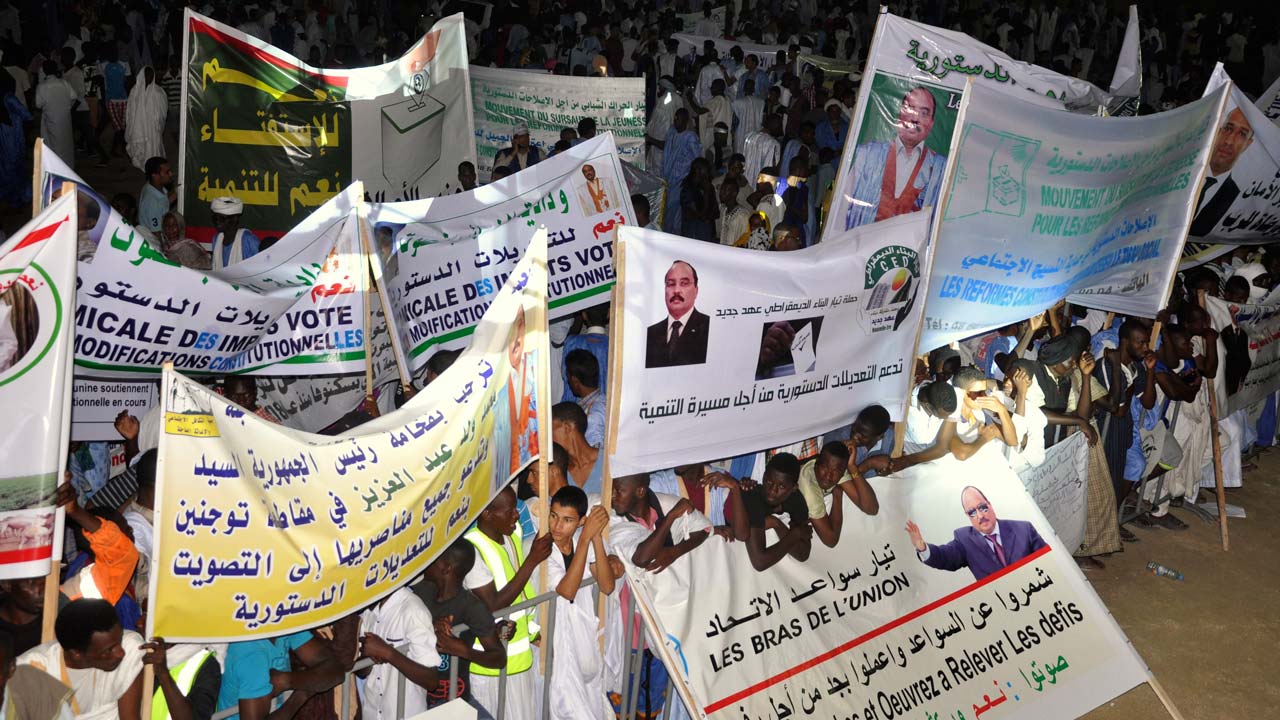
STR / AFP
Mauritanians began voting Saturday on several contentious changes to their constitution sought by President Mohamed Ould Abdel Aziz but opposed by a wide swathe of opposition lawmakers and civil society groups.
Aziz is pushing to abolish the country’s Senate and several other state bodies and to make a small alteration to the national flag, measures that have galvanised a boycott movement hoping to sap the vote’s credibility by forcing a low turnout.
Polling stations opened at 7am (0700 GMT) and were due to close at 7pm (1900 GMT) in the conservative west African nation, where violent clashes have broken out after the authorities banned several rallies planned by opponents of the changes.
After voting, President Aziz told journalists the changes would bring Mauritania “peace, security, stability and development”, and dismissed the boycott movement as existing “only on paper and social media”.
Few others were visible casting their ballots in several Nouakchott polling stations visited by an AFP journalist at opening.
While Aziz and his supporters and several opposition parties are seeking a “Yes” vote, one moderate opposition party is seeking a “No”, while the rest have joined civil society groups to call for a total boycott for amendments they consider unconstitutional.
Jemil Ould Mansour, head of the Islamic Tewassoul party spearheading the movement against the vote, said the country’s leaders would fix the vote and warned of violence on the eve of the referendum.
The opposition also fears that despite Aziz’s claims to the contrary he is laying the groundwork for a third term in power, as his own prime minister said back in July he supported the idea.
Aziz himself fuelled speculation on Saturday by saying that “in two years, or even 10 years other amendments could arise to adapt our constitution to reality,” without elaborating.
He also said journalists questioning why European Union observers were not present had a “colonial mentality”, describing the EU as “not a barometer for the truth.”
Campaign clashes
The boycott movement draws broad political support from figures as diverse as religious conservatives and anti-slavery activists.
They have held several protests attracting thousands of supporters, but have also been prevented from demonstrating by the security forces, who on Thursday shut down several planned rallies close to the capital with tear gas and baton rounds.
The UN Human Rights Office said Thursday that “protest leaders were reportedly beaten up and a number of them were arrested” during campaign rallies in the last few weeks, urging the government “take all necessary measures to ensure free, transparent and credible elections”.
Bedenna Ould Sidi, the head of operations for the country’s electoral commission, said “several” foreign observers were present but would not elaborate.
Around 1.4 million Mauritanians are eligible to vote, and results are expected early next week.
Aziz vs Senate
The proposal to modify the constitution, in force since 1991, was approved by lawmakers in the lower house but rejected by 33 out of 56 senators in March, leading Aziz to call the referendum to push through the changes.
The most contentious measure remains the abolition of the Senate and its replacement with elected regional councils, and Senators have held a sit-in this week and demanded apologies from Aziz for accusing them of corruption.
Unrepentant, Aziz said at a final rally on Thursday the Senate “costs a lot, has no use and does nothing”, and vowed to launch legal action against several senators.
The president came to power by coup in 2008 and was elected in 2009 and again in 2014 for a second five-year term.
There are two ballot boxes in polling stations on Saturday, one for the institutional changes and the other for an alteration to the national flag.
The current green flag with yellow Islamic crescent and star would be altered to honour those who fought for freedom from colonial master France by a red band at the top and bottom, representing blood spilt for their nation, if the measure is passed.
Mauritania won independence in 1960.



